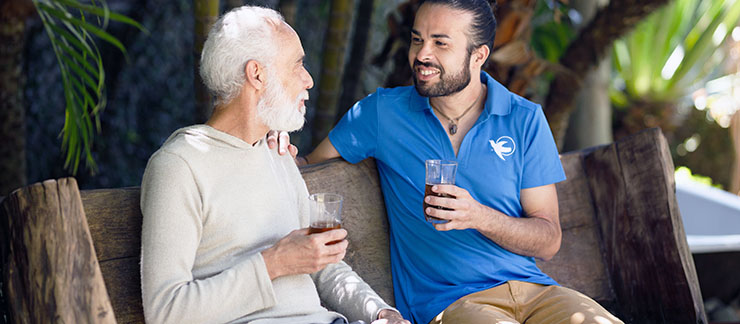
Protect Your Senior from Summer's Rising Temperatures
As temperatures continue to climb during the summer, it is vital to mitigate the risk of heat-related illness, especially for seniors more susceptible to health complications from the increased heat.
Seniors are more prone to health problems during the summer compared to younger individuals due to:
- Their bodies not adjusting to sudden changes in temperature
- Having a medical condition that changes how their body responds to heat
- The effects of prescription medications that impact their body’s natural cooling systems
About 12,000 Americans die from heat-related causes each year, and more than 80% of them are over age 60. Simple steps like running the air conditioning, pulling down the blinds, and installing fans can help seniors stay cool indoors, and limiting sun exposure and overexertion can reduce the risk of heat illness.
Knowing the signs of heat-related illnesses can help your aging family member stay cool and hydrated when temperatures rise this summer.
Related reading: Keep Seniors Safe and Cool in Extreme Heat
Symptoms of Heat-Related Illness in Seniors
Symptoms can manifest in various ways, including dehydration and heat exhaustion. In more severe cases, seniors may experience confusion, rapid heartbeat, and high body temperature, indicating heat stroke, a life-threatening condition requiring immediate medical attention.
Early recognition of the following symptoms and understanding of appropriate responses are critical in preventing severe health complications among seniors during periods of high heat.
1. Heat Stroke
Heat stroke happens when the body cannot control its temperature. During a heat stroke, the body’s temperature rises rapidly, hitting 106 degrees Fahrenheit or higher within 10-15 minutes. Heat stroke can be fatal and requires emergency medical treatment.
Symptoms:
- Confusion and slurred speech
- Loss of consciousness
- Skin that is hot and dry or extreme sweating
- Seizures
- Very high body temperature
How to help:
- Call 911 right away
- Move your loved one to a shaded, cool area
- Cool the skin quickly with a cold-water bath, if possible
- Place cold, wet cloths on the head, neck, armpits, or groin
- Circulate the air with a fan
Related reading: Keeping Your Senior Loved One Safe in the Summer
2. Heat Exhaustion
Heat exhaustion can occur when the body loses too much water and salt, usually through sweating.
Symptoms:
- Dizziness
- Headache
- Heavy sweating
- High body temperature
- Irritability
- Nausea
- Thirst
- Weakness
How to help:
- Take your loved one to a clinic or emergency room for medical help
- Call 911 if immediate medical care is unavailable
- Stay with your senior until help arrives
- Provide water in a cool area, encourage frequent sips
- Remove extra clothing
- Wash the head, face, and neck with cold water
3. Heat Syncope
Heat syncope is characterized by sudden fainting or dizziness, usually when standing too long or suddenly standing. Heat syncope is more likely to occur if a senior is dehydrated.
Symptoms:
- Dizziness
- Fainting
- Light-headedness
How to help:
- Take them to a cool place to sit or lie down
- Encourage them to slowly drink water or a sports drink to hydrate
4. Heat Cramps
When a senior sweats excessively, heat cramps can cause muscle pain in the arms, legs, or abdomen due to low moisture levels. Heat cramps can also be a symptom of heat exhaustion.
Symptoms:
- Muscle cramps
- Pain
- Spasms
How to help:
- Encourage them to drink water and have a snack or sports drink every 15-20 minutes to replace carbohydrates and electrolytes
- Avoid salt tablets
- If your loved one has heart problems, is on a low-sodium diet, or has cramps that don’t go away after one hour, seek medical help
Related reading: Why You Should Worry About Your Elderly Parent Being Dehydrated (and What You Should Do)
Foods and Beverages to Prevent Dehydration
Water is essential for life, especially when temperatures rise in the summer. Seniors can have a lower sense of thirst, and some medications may make them more likely to become dehydrated.
The National Council on Aging recommends seniors drink one-third of their body weight in ounces of water per day. For instance, someone weighing 150 pounds should drink at least 50 ounces (about six cups) of water daily. You can also add slices of fresh fruit or herbs. Low-sugar sports drinks and nutritional shakes for seniors are also good options.
Some older adults find it challenging to reach this goal on water alone, but food and other beverages also count. At every meal, choose high-water-content foods, such as celery, cucumbers, lettuce, strawberries, tomatoes, and watermelon.
Alcohol removes water from the body, so encourage seniors to limit or avoid drinking, especially in the summer heat.
Related reading: 4 Ways Home Care Can Provide Summertime Relief
Safe Summer Fun for Everyone
Summer heat can make it challenging for seniors to stay hydrated and healthy, but you don’t have to do it alone.
Visiting Angels caregivers can help. We have experience in helping to make the summertime more enjoyable for older adults. Our caregivers are trained to keep seniors safe and spot symptoms of heat-related illness.
Stay ahead of the summer heat with a Visiting Angels caregiver by your senior’s side. Contact us today to learn how we can make a difference in your loved one’s well-being.


